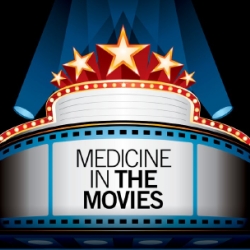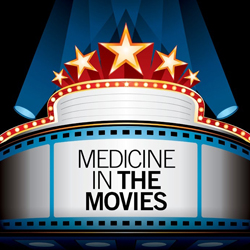 It has been said that ‘no other art form pervades the consciousness with as much power as film’1.
It has been said that ‘no other art form pervades the consciousness with as much power as film’1.
Film is omnipresent, crossing boundaries of age, culture and time. Despite this, there is little conscious awareness of the medium’s profound ability to influence our opinions – particularly about emotionally charged topics.
The impact of film on the public perception of medicine – especially mental illness – has been notably pronounced. As Alexandra Blackman describes, this influence can be positive or negative, and even be used for recruitment.
A timeline of medicine and the movies
At its best, film provokes an immediate and enduring bond with the viewer. As they are transported into the reality of the protagonist, there is potential for genuine empathy and greater understanding of individual experience. This gives filmmakers the power to alter our perception of an issue depending on their agenda. In medicine, and particularly mental illness, this agenda has changed over time as more is learned about the complex and ubiquitous nature of many conditions and the clouds of stigma slowly evaporate.
In 1960, the film ‘Psycho’ was released. Norman Bates’ creepily oedipal character slashing A-list celebrities in the shower (not to mention hiding his mother’s skeleton in the basement) undoubtedly perpetuated misinformed opinions about the dangerousness of mental illness, and the confusion between schizophrenia and dissociative identity disorder.
The classic example of ‘One Flew over the Cuckoo’s Nest’ (1975) suggests that psychiatric hospitals are akin to prisons, inhabited by patients with no autonomy and robotic staff completely devoid of empathy. Measures such as restraint and ECT are sensationalised and shown as a means of control.
Fast-forward 23 years and a very different perspective is seen in ‘Patch Adams’, highlighting the importance of humour and humanity in healthcare, whilst promoting medics as individuals complete with human complexities and flaws. Who could forget Patch’s line “You treat a disease, you win, you lose. You treat a person, I guarantee you, you’ll win, no matter what the outcome”2.
Similarly the 2004 film ‘The Aviator’ can be considered a valid attempt at exploring the debilitating effects of a mental illness from the individual’s perspective. The portrayal of the descent into obsession and compulsion of the billionaire genius Howard Hughes, clearly attempts to provoke an emotional reaction from the viewer that only comes with genuine empathy.
Films such as ‘Psycho’ and ‘One Flew over the Cuckoo’s Nest’ must take partial responsibility for the pervading stigma of mental illness, not to mention public opinion of treatments such as ECT. This stigma is undeniably one of the reasons that a small proportion of people access healthcare for their mental health problems.
In fact, when the UK charity MIND surveyed 515 people with a diagnosed mental health problem, half of them reported that media coverage of mental illness had a negative impact ontheir own mental health3. Worryingly a quarter felt they had experienced hostility from neighbours following such reports3.
However, when the media portrays illness and healthcare in a more sympathetic light, the reaction can be just as profound. It is perhaps reassuring that although critics hold ‘The Cuckoo’s Nest’ in great esteem, ‘Patch Adams’ is by far the more popular of the two in public rating-scales4,5.
So how can we tackle the residual elements of mental health stigma? ‘Bedlam’, the Channel 4 documentary series on mental health in South London and Maudsley NHS Foundation Trust (SLAM) attempted to do just that. By closely following specific people this highlighted the individuality of mental illness and the realities of healthcare.
We met James, a young man with severe anxiety, and were invited into his family home to see the true impact his symptoms have on their daily life. We also met Helen who had recurring thoughts that she had put passers-by in the bin. Despite having insight into the absence of logic in this worry, the worry persisted none-the-less, and Helen shared the impact her symptoms have had on her intimate relationships.
James is a university student, Helen works at a prominent London museum. We could pass either of them in the street, or have a drink with them, and not realise the torment either of them suffers on a daily basis. They could so easily be us, or someone we care about, and that is how they are portrayed.
Reviewed in the Guardian as “a fair portrayal of a fascinating place”6 this will hopefully have a positive impact on public perception of mental illness.
A short history of ‘Medfest’
Medfest was founded in 2011 by Dr Kamran Ahmed, a psychiatry trainee in SLAM, as the UK’s first medical film festival. The aims were twofold: to use the power of film to provoke discussion of pertinent topics in medicine, and to increase interest in psychiatry.
Evening events were held in nine universities across the country, showing a selection of short-films, documentaries and animations on the theme ‘The Image of Doctors in Film’. These were then discussed between the audience and expert panellists, who included Max Pemberton and actress Shobna Gulati.
Although coordinated nationally with identical programmes, each event was organised and chaired by a local psychiatry trainee or ‘Psychsoc’ lead. The programme included ‘Shadow Scan’ – a BAFTA winning short film documenting a medic’s first-hand experience of healthcare, starring panellist Shobna Gulati. The events were well received at all sites, and as the first festival of its kind Medfest caused a small sensation in the medical and psychiatric communities, culminating in a review in the Lancet7.
Over the next two years Medfest continued to expand, although the format has remained the same. Featuring the celebrated ‘Animated Minds’ series of films, the 2012 ‘Healthscreen’ festival included 16 universities and hosted 1000 attendees. 2013 reached an impressive 21 universities – appropriately enough discussing ‘the Power of Medicine’.
Films were diverse and included a clip of the contemporary documentary ‘Russell Brand: From Addiction to Recovery’ and the BAFTA winning animation ‘Mother of Many’ – examining the benefits of a good doctor-patient relationship. The 2013 event also saw the advent of the Medfest: Music event at the National Psychsoc Conference, and culminated in a showcase event at the Royal Society of Medicine.
Medicine: from cradle to grave The theme of Medfest 2014 is ‘Medicine: from Cradle to Grave’. The programme will be split into three sections representing the main stages of life – namely childhood, middleage and old-age/death. The concept of health is a constant that affects us throughout our lives for better or worse.
The lesser discussed fact is that this includes our mental health, a reality which can become apparent at any stage in life. In our early years we are exposed to ‘predictive factors’ for mental illness, many of which are decided for us. As we travel through middle age, most people will have come face to face with the fragility of mental health in some way.
Finally we end with the natural breakdown of that which makes us human – our cognition, to say nothing of the psychology surrounding death. Physical and mental wellbeing are so intrinsic within the lifecycle that exploration of this journey through film cannot fail to evoke a reaction in the audience, be it emotional or edifying. That is, at least, the hope.
So far there are thirty confirmed events at medical schools in the UK and Ireland. This will be the first International Medfest festival as we also look to hold events in America, Africa, and continental Europe. The Medfest: Music event will once again form part of the festival, and we will also see the first Medfest art exhibition in London. Excitingly, the gala event this year will be held at the Royal College of Psychiatry, which hopefully will be the first of many.
The 2014 festival will hopefully prove to be another entertaining event that inspires the budding psychiatrists in the audience to carry on the crusade against stigma. As Norman Bates said himself, “We all go a little mad sometimes”.
If you would like to know more about Medfest, or to get involved in Medfest 2014, please visit www.medfest.co.uk.
1. 'Movies and Mental Illness' D. Wedding, M Boyd, R Niemiec. 3rd edition, Hogrefe publishing, 2009 2. 'Patch Adams' 1998, screenplay Steve Oedekerk 3. Mind survey 'The Daily Stigma', February 2000 4. http://www.boxofficemojo.com/movies/?id=patchadams.htm 5. http://www.boxofficemojo.com/movies/?id=oneflewoverthecuckoosnest.htm 6. Sam Wollaston 'Bedlam – TV review', The Guardian, Friday 1 November 2013 7. Holmes, D 'Falling from their pedestal - doctors on film' The Lancet. 2011, 377 (9780),1825




